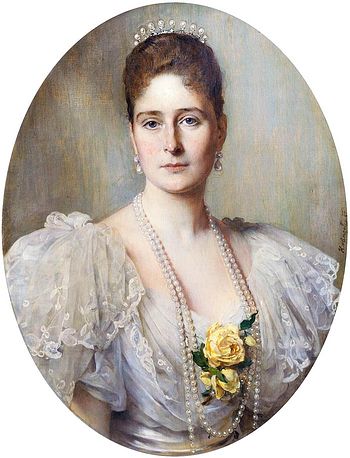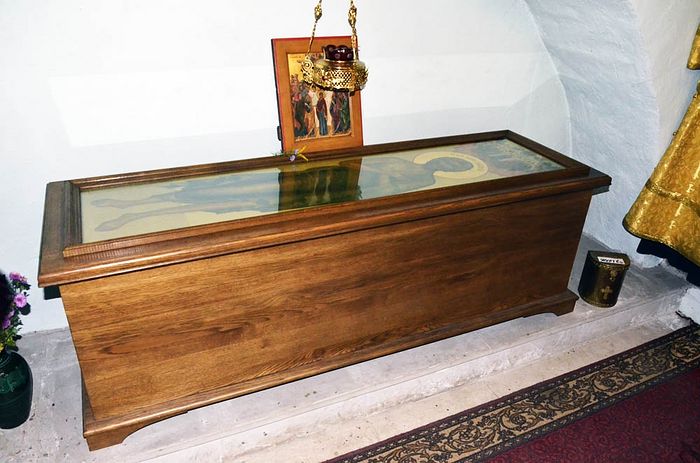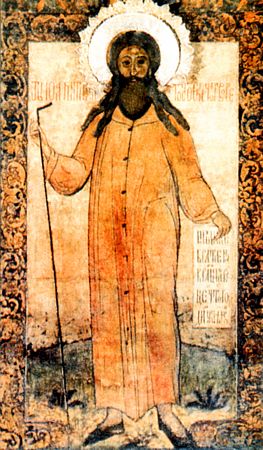Archpriest Andrei Tkachev

Empress Alexandra Feodorovna
Archpriest Andrei Tkachev
When during the outbreak of the First World War, Russia’s enemies wanted the death of the monarchical family and the destruction of its sovereignty. A sort of “blood libel” on the dynasty was the German origins of the Empress Alexandra Feodorovna and her sister (Grand Duchess Alexandra Feodorovna). Rumors were spread: Supposedly the Tsaritsa was sending telegrams from Tsarskoe Selo straight to German headquarters with military secrets, and various other absurdities. Along with the absurdities came a heap of dirt. And did the people, exhausted with war and too trusting of all sorts of blather, need much to get them going? We know what happened after that. But what few know is that Germans in Russia are nothing new, and by no means were they all associated with something bad.
There was a time when Russians called all foreigners nemtsy, [which means “mute” and is now the word for “Germans”], with no differentiation between nationalities. Our ancestor’s logic was: If he doesn’t speak Russian, it means he’s mute. That is, a nemets But here we’re talking about the natural Germans, so well known to Russians from the twentieth century, when the two nations tangled to the death. And we’re not talking about recent times, but much earlier times.
In the middle of the distant thirteenth century, from the glorious city of Lübeck, a merchant named Procopius came to Novgorod the Great. Perhaps he had a different name earlier (today it’s hard to imagine a German with such a name), but he went down in our history as St. Procopius of Ustiug. He was a merchant; the path of Germans to Novgorod was well worn. The cities of the Hanseatic League traded with Novgorod (to the great envy of all the other Russian lands) very enthusiastically. They called Novgorod the “wallet of Rus’”. Our Lübeck citizen would walk around to the churches of Novgorod, was amazed by the beauty of the Church services, marveled at the number of churches, listened to the Sunday peal of bells, and… didn’t return home. He gave away all his possessions, as the patericons say to do, and became a monk. When he had made some progress in prayer and the people started praising him, he started behaving as a fool. And then he completely ran away from the Novgorod that had come to love him. He ran as far as the Vologda regions, to Veliky Ustiug, where he finished his days without ever abandoning his podvig of foolishness for Christ. He was a miracle worker both before and after his death. He was a godly man. A saint of Russia, a natural German, the compatriot of Günter Grass and Thomas Mann.
Let’s look back a little further. Somewhere in the beginning of the fifteenth century, not from glorious Lübeck but from glorious Brandenburg, and not to glorious Novgorod but to the no less glorious Rostov the Great, for some reason came one German Catholic. We don’t know his name before receiving Orthodoxy. In Orthodoxy he is honored as St. Isidore of Rostov. He was also, by the way, a fool-for-Christ. He was clairvoyant in his lifetime, and for the exactitude of his prophecies he was called by the townsfolk “Tverdislov”, which means, “Firm Word”. Ivan the Terrible strongly revered his memory after death, and Ivan did not particularly care for the Germans because of their “fierce Lutheran heresy”[1] that had already made its appearance by that time.

The reliquary of St. Isidor Tverdislov.


Empress Alexandra Feodorovna
Archpriest Andrei Tkachev
When during the outbreak of the First World War, Russia’s enemies wanted the death of the monarchical family and the destruction of its sovereignty. A sort of “blood libel” on the dynasty was the German origins of the Empress Alexandra Feodorovna and her sister (Grand Duchess Alexandra Feodorovna). Rumors were spread: Supposedly the Tsaritsa was sending telegrams from Tsarskoe Selo straight to German headquarters with military secrets, and various other absurdities. Along with the absurdities came a heap of dirt. And did the people, exhausted with war and too trusting of all sorts of blather, need much to get them going? We know what happened after that. But what few know is that Germans in Russia are nothing new, and by no means were they all associated with something bad.
There was a time when Russians called all foreigners nemtsy, [which means “mute” and is now the word for “Germans”], with no differentiation between nationalities. Our ancestor’s logic was: If he doesn’t speak Russian, it means he’s mute. That is, a nemets But here we’re talking about the natural Germans, so well known to Russians from the twentieth century, when the two nations tangled to the death. And we’re not talking about recent times, but much earlier times.
In the middle of the distant thirteenth century, from the glorious city of Lübeck, a merchant named Procopius came to Novgorod the Great. Perhaps he had a different name earlier (today it’s hard to imagine a German with such a name), but he went down in our history as St. Procopius of Ustiug. He was a merchant; the path of Germans to Novgorod was well worn. The cities of the Hanseatic League traded with Novgorod (to the great envy of all the other Russian lands) very enthusiastically. They called Novgorod the “wallet of Rus’”. Our Lübeck citizen would walk around to the churches of Novgorod, was amazed by the beauty of the Church services, marveled at the number of churches, listened to the Sunday peal of bells, and… didn’t return home. He gave away all his possessions, as the patericons say to do, and became a monk. When he had made some progress in prayer and the people started praising him, he started behaving as a fool. And then he completely ran away from the Novgorod that had come to love him. He ran as far as the Vologda regions, to Veliky Ustiug, where he finished his days without ever abandoning his podvig of foolishness for Christ. He was a miracle worker both before and after his death. He was a godly man. A saint of Russia, a natural German, the compatriot of Günter Grass and Thomas Mann.
Let’s look back a little further. Somewhere in the beginning of the fifteenth century, not from glorious Lübeck but from glorious Brandenburg, and not to glorious Novgorod but to the no less glorious Rostov the Great, for some reason came one German Catholic. We don’t know his name before receiving Orthodoxy. In Orthodoxy he is honored as St. Isidore of Rostov. He was also, by the way, a fool-for-Christ. He was clairvoyant in his lifetime, and for the exactitude of his prophecies he was called by the townsfolk “Tverdislov”, which means, “Firm Word”. Ivan the Terrible strongly revered his memory after death, and Ivan did not particularly care for the Germans because of their “fierce Lutheran heresy”[1] that had already made its appearance by that time.

The reliquary of St. Isidor Tverdislov.
The common approach to history says that the Russians were very happy to flee their “house prison” to the world of temptations and pleasures in Western civilization. Supposedly there was nothing to do in Russia. What could one do there? “Depressing firelight and melancholic villages”? Well, no more than fight wars, make money in trade, or hide in our vast expanses from problems back home. But now you’ve heard of two whole Germans who came to Rus’ for the Holy Spirit, although it certainly bloweth were it listeth. And both of them took on the very difficult form of Christian asceticism—foolishness for Christ—and achieve sainthood in it. Yes, two! But wait, there is a third.
About a hundred years after Isidore, in that same Rostov the Great was yet another German. Here he was called John the Hairy. Maybe he was following in Isidore’s footsteps in the direction of Lake Nero, or maybe God’s special Providence in some special way led these chosen souls from the West to the East, but you’ll be surprised… This German also led the life of a fool-for-Christ and had the gift of healing, for which he was called not only the Hairy but also the Merciful. It was noted that he never parted with his Psalter. He read it constantly. He was even buried with it. His Psalter, be the way, was in Latin. He died in the year 1581—only a short time before the Time of Troubles.

St. John the Hairy/Merciful.
Beloved readers, just think about it! It will make you smile, maybe even laugh with joy and amazement. Or maybe it will even frighten you. Germans are coming to us in Russia, to these, “poor villages”, to this eternal roadlessness and harsh climate. They are coming to a people that is alien to them, and who if today are not very gentle, just imagine them then… They come single file, like pilgrims, from century to century, so that here, in this mass of ignorance, they can read the Psalter in Latin, spend the night on the church steps, live on alms and pray to God for the whole universe! Our people have gone and now go to the West not at all to pray. Oh no, not to pray. But these! Perhaps those men from Lübeck and Brandenburg learned and understood in our land and history something that we who live here don’t feel or understand? And this has happened with a certain regularity since time immemorial, before Tchaikovsky and Dostoevsky, before the wild flourishing of Russian culture that is understandable to the West, before all the discussions on the “enigmatic Russian soul”.
There are many continuations and tangents on this theme, because later Dutchmen and Scottsmen, Frenchmen and Germans also came to Rus’. They came for adventure, for money or fame, out of curiosity or for some personal reasons. They come and they go. Others come and stay. And many who have stayed are better than those who were born here. It’s because with their foreign-born souls they can discern a fragrance where the natural Russian has lost the scent long ago. And these new, unexpected brothers of ours in a way that is absolutely their own, with unearthly acuteness and depth feel the beauty and power of the Russian land and the Russian faith. Whether lisping or burring, they say, “I am Russian and Orthodox!” and these words cost are very dear. It’s been that way throughout our history. And St. Seraphim of Vyritsa said that it will be that way to the end of time.
Archpriest Andrei Tkachev
Translation by OrthoChristian.com
Pravoslavie.ru
11/25/2018
Δεν υπάρχουν σχόλια:
Δημοσίευση σχολίου